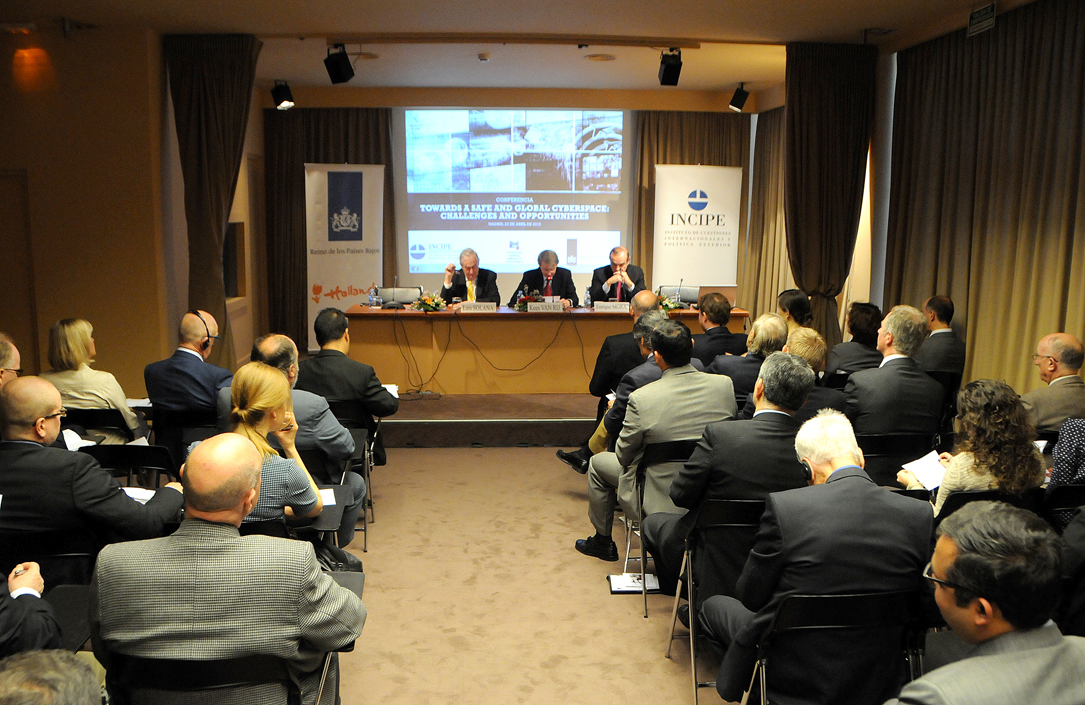Conference: Towards a safe and global cyberspace: challenges and opportunities

On April 23, 2015, INCIPE co-hosted a conference with the Embassy of the Kingdom of the Netherlands in Madrid titled Towards a Safe and Global Cyberspace: Challenges and Opportunities. The goal of the conference was to inform a broad audience on the outcomes of the Global Conference on Cyberspace held in the Netherlands this year, as well as to expand on the current challenges cyberspace poses and its influence on modern society.
The conference opened with an introduction to the topic by Luis Solana, INCIPE’s vice president. His introduction was followed by two more regional specific presentations by Kees van Rij, Ambassador of the Netherlands to Spain, and Enrique Mora, General Director of Foreign Policy and Security in Spain. Keynote speakers were introduced by Vicente Garrido, INCIPE’s Director.
Former Minister of Foreign Affairs of Netherlands and Special Envoy for GCCS 2015 Uri Rosenthal offered a brief introduction to the goals and outcomes of the GCCS conference this year. The Global Conference on Cyberspace, held the 16th and 17th of April in The Hague, brought together leaders form the public, private, academic and non profit sectors in hopes of solidifying international support for cyber security. Dr. Rosenthal confirmed that the conference was a success and assisted in moving the global community into an age where both opportunities and dangers of the cyber sphere are thoroughly understood and dealt with in an efficient manner.
Alicia Moral, Ambassador at Large for Cyber Security for the Minister of Foreign Affairs in Spain, discussed the international political impacts of internet communication. Ms. Moral discussed the threats cyber attacks pose to government infrastructure and the potential international laws and norms that could be implemented on national, continental and international levels in order to reduce these threats. She briefly introduced EU, UN and NATO legislation. Ms. Moral explained that these regional relationships are essential in building capacities against the threats posed by cyber terrorists, detailing that while it is the highest priority for the web to be free and accessible, it is also important that it is safe.
Andrew Puddephatt, the Executive Director of Global Partners Digital, discussed how human rights are inextricably linked to the management of cyberspace. Mr. Puddephat discussed the notion that while security and regulation on the web are essential to maintain global order and safety, the regulations should not impose on freedom of expression, right to privacy or impose on innovation. The internet provides a space for debate, information sharing, organization and mobilization; all key aspects of democratic freedom of expression. However, these same capabilities are used by criminals in order to propagate international crime. Just like in the actual (as opposed to virtual) world, global safety must be weighed with human rights in order to create a society that is both a safe and progressive. In order to do this, analogue style policy makers need to move from the defensive to the offensive; creating legislation that prevents criminal activity online rather than works to repair its negative impacts.
Manuel Carpio, Director of Information Security and Fraud Prevention at Telefónica, concluded the presentation section of the conference with a discussion on the current technical and regulatory challenges for cybersecurity in Europe. Mr. Carpio explained that regulating online activity is the biggest challenge in cybersecurity. New innovations like tor browsers and proxies prevent government officials to pinpointing the location of criminal activity online. CERT and SOC specialists will need to refine their regulation tools in the near future in order to better target dangerous activity online.
In the debate following the presentations, the audience took the opportunity to ask the keynote speakers about their opinions regarding specific topics in cybersecurity. Discussion points included the morality of big data, the feasibility of implementing confidence measures between nations, the equilibrium between security and freedom, potential dangers surrounding the internet of things and the applicability of international human rights norms to the virtual world.
Madison Ordway
INCIPE







